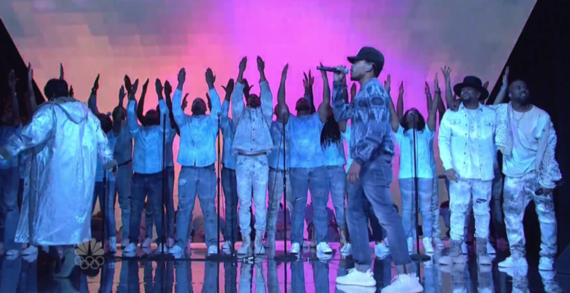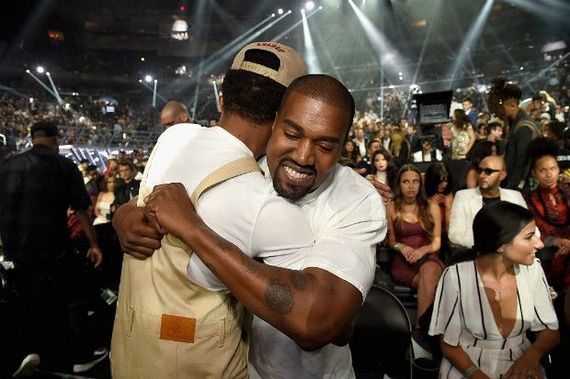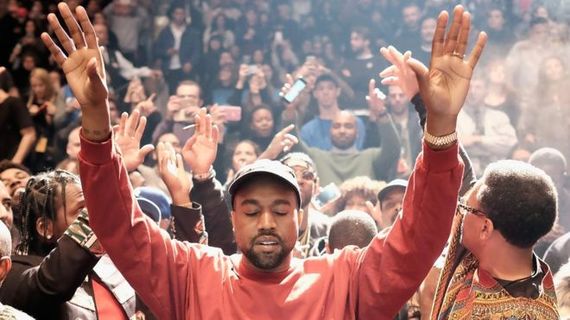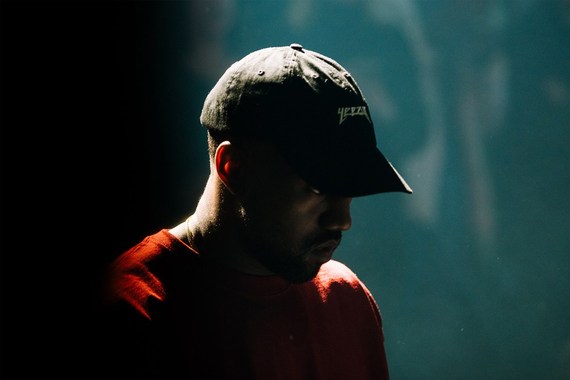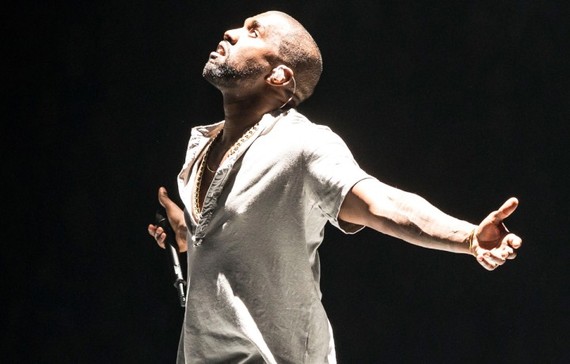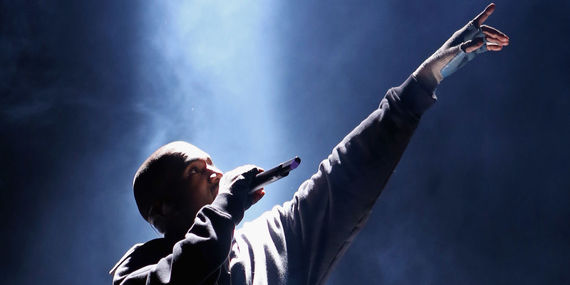"Kanye's best prodigy/He ain't signed me, but he's proud of me"
-Chance the Rapper Blessings (Reprise)
"I made Jesus Walks, I ain't never goin' ta hell ... "
-Kanye West Otis
Following a string of bizarre behavior last month--hallmarked by a protracted, stream of conscious tirade targeting Beyoncé and Jay Z, signaling support for Donald Trump's looming presidency, and abruptly ending the Sacramento stop of his Life of Pablo tour--Kanye West voluntarily submitted to hospitalization and a psychiatric evaluation, citing sleep deprivation and exhaustion. While officials at the Ronald Reagan UCLA Medical Center in Los Angeles discharged Kanye West about two weeks ago, his reported bout with depression and paranoia caused him to cancel the remainder of his North American tour dates, in addition to the European leg of his tour. The entire episode has caused people to reflect on the "tragedy and triumph" of Kanye West's storied career, and its precipitous decline. Ostensibly, the first verse of J. Cole's False Prophets serves as the most visible example of this line of commentary. Others used Kanye's hospitalization to opine on how it demonstrates the need to have a more comprehensive discourse on the mental health of young African American men. Scores more encouraged people to "pray for Kanye," most notably Chance the Rapper, who offered an inspired prayer for his beloved mentor during a BBC Radio appearance, and canceled his remaining European tour dates, possibly to be by Kanye's side. Chance knows, like many of us do, Kanye needs Jesus.
It seems perfectly fitting scores of people would rush to pray for Kanye West. In his stirring single, Through the Wire, he introduced himself to the world by describing how he twice cheated death (using '"two lifelines ... in the same hospital where Biggie Smalls died"). With the subsequent release of his triumphant anthem Jesus Walks, he begged God "to show him the way, 'cause the devil's trying to break [him] down." Kanye West introduced himself as the type of rare artist willing to share his vulnerabilities and insecurities.
Similarly, it should surprise few Chance the Rapper would lead the charge praying for Kanye. Since the moment Kanye West stepped into the public light, he has embraced some semblance of Christian faith, even if it meant simultaneously squeezing the hallowed and the hellish. He has inveigled his followers to do the same. Chance the Rapper, by his own admission, is one of those eager followers.
More succinctly, Chancelor Jonathan Bennett is Kanye Omari West's most prodigious protégé, his most faithful disciple. Certainly, Lupe Fiasco, Kid Cudi, Big Sean, Vic Mensa, and a bevy of others can attest to how Kanye West launched their respective careers. They may further lay claim to the notion of continuing Kanye West's illustrious legacy. Notwithstanding, none do so more convincingly than Mr. Bennett, or Chance the Rapper as the world has come to know him. One need look no further than Coloring Book, the rousing, GRAMMY-nominated mixtape he released on May 12th of this year.
As Jack Hamilton writing for Slate put it, Coloring Book, with its rhapsodic melodies, dexterous rhythms, jubilant flows, and impassioned lyrics, fits "squarely in the tradition of late-period Kanye West, Chance's Chi-town forefather and primary musical inspiration." On it, Chance deftly melds the sacred and the secular in ways Kanye West has since his February 2004 release of The College Drop Out. In true Kanye form, Coloring Book boasts a distinct, original voice, timely, emotive content, and an unabashed celebration of Christian cultural roots, sprouting forth from the "gravitational pull of the black church," whose significance on the "culture of black life cannot be denied." West has gone as far as to proclaim Chance the Rapper is "the future." The two have worked extensively together this year, first on The Life of Pablo, then Coloring Book.
It is a wondrous thing to evolve from a budding musician clamoring for the attention of his idol, to becoming one of his idol's most trusted collaborators. Nevertheless, that is where Chance the Rapper found himself as he penned a verse, and arranged harmonies for the choir portion of West's Ultralight Beam (in addition to contributing to Waves and Famous), which some consider the best hip-hop song of the year. Ultra Light Beam derives its title and overarching concept from the blinding "light from heaven [that] shone around [the Apostle Paul]" on the road to Damascus.
Saul, born in Tarsus of Cilicia, to the tribe of Benjamin, circumcised on the eighth day, trained "at the feet of Gamaliel," zealously sought to preserve the sanctity of the faith "taught according to the law of our fathers." His zeal broiled within him as he breathed "out threatenings and slaughter against the disciples of the Lord." While en route to persecute followers of "the Way," Saul saw the light from heaven, and this experience began one of the more notable conversions in recorded history. Thus, Saul of Tarsus became Paul the Apostle. So when Kanye West sings, "We on an ultra light beam," he is claiming to have seen the same light that knocked the Apostle Paul to the ground. Kanye confirmed The Life of Pablo's allusions to the life of the Apostle Paul in February by saying, "Paul ... The most powerful messenger of the first century ... Now we stand here twenty centuries later ... Because he was a traveler ... "
With this in mind, one may begin to understand why Kanye West described his latest studio offering as a "gospel album," more precisely a "gospel album with a whole lot of cursing on it." In an interview with Apple Music's Zane Lowe earlier this spring, Chance the Rapper explained The Life of Pablo's gospel leanings as such, "When Kanye said he was making a gospel album, he did not mean gospel the genre, he's talking about literally ... the Gospel in terms of telling a story and repeating a historic happening, and documenting it." In short, The Life of Pablo is "The Gospel According to 'Ye." Undoubtedly, reconciling authentic biblical faith with Kanye's lewd, lascivious, lyrics, which defy biblical mandates for sexual morality, is quite difficult. Moreover, dismissing his egotistical bombast, that casts aside biblical commands for humility, also proves an arduous task. Some have simply labeled Kanye West as "blasphemous," "satanic," "sinister," and "evil." Even Kanye himself has joked about his own devil worship.
Nonetheless, Kanye West has always believed; it is what he has told his audience from the beginning. In his first Source interview in April of 2004, he told Thomas Golianopoulos, "All my songs are about something that was negative and how God can help you through it," he released Jesus Walks, legitimately believing it a gospel song (a notion some argue was affirmed by its STELLAR Award nomination), posed as Christ on the cover of Rolling Stone in 2006, called his previous album Yeezus, and repeatedly told Zane Lowe, "I'm a Christian" in their September 2013 interview (though one should note, he also proclaimed he is a god in the same interview). He has also talked about his love for fashion, by saying, "Any time we create, we're an extension of doing [God's] work on earth."
Kanye West never shied from presenting his glaring contradictions for the world to see; it has become his signature. For more than a decade, he has constructed a brand erected upon the foundation of such brazen inconsistencies. It is how he can proclaim he is a god and a slave to finely woven, imported fabrics and recherché linens in the same interview, or how also in that interview, he could say, "F--- and your corporations, y'all n----s can't control me," while clamoring for a "joint venture" and/or "corporate backing." Thus, The Life of Pablo, by West's own estimations is a gospel album, even if it is gospel by desperation, because he fully believes he can operate within a space of mutually exclusive ideas.
In A History of Christianity in Africa, Dr. Elizabeth Isichei explains this phenomenon by writing, "Wherever Christianity is professed, there is a constant dialectic arising from its relationship with the cultural presuppositions and practices of the cultures where it is located." The Life of Pablo, with its penchant for the outrageous (i.e. prayers laden with talk of bleach stained t-shirts), participates within this continuum. In that manner, Kanye West continues the pluralistic amalgamation of Christianity with other faith traditions and cultural transmissions. In so doing, he also has endeavored to push the bounds of what qualifies as authentic Christianity.
Kirk Franklin sought to explain this when he defended his collaboration with Kanye West. He to took to Facebook to say:
Kanye is not me. I am not him. He is my brother I am proud to do life with. No sprints, but marathons; like most of us are on. Before one song was released, I was crucified because my brother asked me to take a picture. Again, '[N]o Kanye, you're not good enough?' No. That is a dangerous message I believe we send to the world when our posture is they have to meet certain requirements before they are worthy to kiss the ring. It says people are not redeemable, forgivable or candidates for grace. That my friend is religious. I will not turn my back on my brother. I will love him, prayerfully grow with him.
In his statement, Kirk Franklin hinted at the words of Christ,"Those who are well have no need of a physician, but those who are sick." He understands that Kanye West is a fallible man longing to connect with an infallible God, and thereby, Kanye West's circuitous pursuit of Christ puts him in the same company as a host of other broken people searching to be made whole by a perfect savior. Christ came for this very purpose. The scribes and Pharisees called Christ a "friend of sinners," though in derision, because people often observed Christ among miscreants and outcasts. It is as Jay Electronica once rapped, "You can find the Christ where the lepers and the lames at." This comports with the larger idea that Christ showed mercy and compassion to those condemned by religious leaders. He recognized authentic worship emanating from the hearts of those the sanctimonious scribes and pious Pharisees reviled: a dying criminal, a licentious Samaritan woman, an unscrupulous tax collector, a woman with "many sins," ten lonely lepers, et al.
The Life of Pablo proffers the question what does authentic Christianity look like?
Will mere professed belief suffice? The Life of Pablo's detractors imply otherwise. The Life of Pablo's most ardent critics denounce its lack of conventional cultural transmissions associated with gospel music specifically, and Christianity more broadly. In other words, it lacks traditional aspects of gospel compositions. Yet is Christianity bound to the sum total of the formalized patterns of worship such as ritualistic liturgies and sung hymns? Does the faith exceed the spirited exuberance of Pentecostalism bursting forth from stained-glass windows on Sunday mornings? Is the pursuit of Christ more than rigid adherence to cultural interpretations of holiness? Can the "Good News of Jesus Christ" be reduced to standard chord progressions, prototypical rhythmic phrasings, and formulaic lyrical content? These conceptions of what characterizes Christianity, these finite vantage points, skew the lens from which many view the faith, and ignore an expansive history of people's attempts to define and redefine what it means to follow Christ.
For centuries, the Christian faith has displayed a proclivity towards syncretistic adaptions of pagan worship. The vestiges of paganism in Christianity reveal themselves each winter and spring during celebrations marking the birth and resurrection of Christ. Thereby Kanye's musings do not represent a distinct novelty, but rather they represent a component of time-honored traditions mingling the pure and the profane within the Christian context. Consequently, creating definitive boundaries for a faith whose history spans millennia has befuddled practitioners and theologians since the first century. Nevertheless, there must be a means with which to constrict the boundaries to determine what constitutes Christianity. What more than professed belief, yet short of the traditions of men can people look for in Kanye West? What many find lacking in Kanye West's Christianity, aside from its failure to conform to their customs, is its inability to produce "fruits meet for repentance." Kanye West's critics want to see a modicum of evidence which would indicate he has had a genuine encounter with the God of the Bible, and come away new.
The aforementioned miscreants and outcasts who encountered Christ demonstrated sincerity of conviction, even if with their dying breath. The dying criminal freely acknowledged his crucifixion amounted to "due reward for [his] deeds," and pleaded with Christ to "remember me when you come into your kingdom." The licentious Samaritan woman, after meeting Christ at a well just outside of a town called Sychar, ran to her village and declared, "Come, see a man who told me all that I ever did. Can this be the Christ?" Christ visited the home of the Zacchaeus, the unscrupulous tax collector, and after communing with him, Zacchaeus said, "Behold, Lord, the half of my goods I give to the poor. And if I have defrauded anyone of anything, I restore it fourfold." The woman with "many sins" knelt before Christ, washed his feet with her tears, then dried them with her hair, all after having anointed his body with precious perfume from her alabaster box. One of those ten lonely lepers came back to Christ to express his gratitude for having healed him. While each of these men and women received the contempt of the deeply religious for various moral failings, perceived or actual, upon encountering Christ, each one exhibited deep contrition, coupled with a desire to live life anew. The Gospels of the New Testament are replete with such examples. The Life of Pablo is not.
Kanye's decline has become typified by his failure to create the progressive, innovative music and corresponding performances thereof that once represented the highlight of his career. He now seems content to spiral slightly coherent rantings on social media and discussing life with the President Elect. The listening public once fully expected Kanye West to create the type of provocative performance Kendrick Lamar offered at the 2016 GRAMMYS; however, Kanye purportedly stewed at home because he could not receive a guarantee to receive the award for "Album of the Year." Similarly, Coloring Book is a closer approximation to the album Kanye told the listener to expect with The Life of Pablo. His ramblings on Twitter, and the middling work he produced with The Life of Pablo appear nothing short of a desperate plea for help. The Life of Pablo is not a gospel album by any customary measure, though people may continue to debate where it sits in the pantheon of art that toes the line of sacred and secular. Indeed, if anything, it communicates how Jesus may walk with Kanye, while inquiring as to whether Kanye walks with Jesus. The Life of Pablo's dichotomous themes call that into question. Perhaps that is why it is no longer just Jermaine Cole calling him a false prophet, and all the more reason why people should still pray for Kanye.

